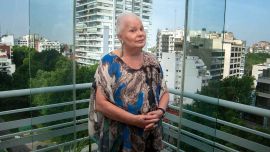Poverty in Argentina spiked as inflation surged toward 100 percent, wiping out a year of gains and adding pressure on the cash-strapped government to spend more on social welfare before October’s presidential election.
About 39.2 percent of Argentines were living in poverty in the second half of last year, up from the previous level of 36.5 percent, according to government data published Thursday. It’s below the peak seen during the pandemic but a clear sign that inflation is taking a heavy toll on Argentina’s society and economy, which is seen entering a recession this year.
Historically high poverty levels will pressure President Alberto Fernández and his Peronist coalition to provide more welfare aid before the election. That’s a difficult task as Argentina committed to lowering its fiscal deficit this year by cutting spending as a crop drought is reducing exports and tax revenue. The fiscal deficit is a key target in Argentina’s US$44.5-billion agreement with the International Monetary Fund.
No matter which party wins the election, Argentina’s worsening social situation poses a major challenge for the next government and its ability to pass tough-medicine economic measures. Investors expect the next administration to devalue the currency, a step many analysts say is needed to make the economy more competitive but would likely further impoverish the country in the short-term via a spike of inflation.
More people entered poverty at the end of last year as the government’s political crisis supercharged already-high inflation levels from 64 percent to 95 percent within six months. By this past February, inflation had reached 103 percent and economists anticipate it will continue climbing. Wages for informal workers, who tend be poorer than salaried payroll employees, were only up 65 percent by the end of last year, meaning they lost significant buying power.
That trend showed up in Argentina’s gross domestic product, which contracted in the fourth quarter last year by the most since the pandemic, according to recent official data. The decline was fuelled in part by a sharp drop in consumer spending. Economists forecast that Argentina’s economy will contract three percent this year.
Higher destitution also dispels the country’s recovery from the pandemic. While unemployment is at its lowest since 2015, the majority of job gains are in low-wage sectors, such as tourism and retail. In fact, nine out of 10 poor children in Argentina actually come from households with at least one working adult, according to a report from UNICEF and Buenos Aires-based non-profit La Poderosa.
related news
by by Patrick Gillespie & Silvia Martinez, Bloomberg



















Comments